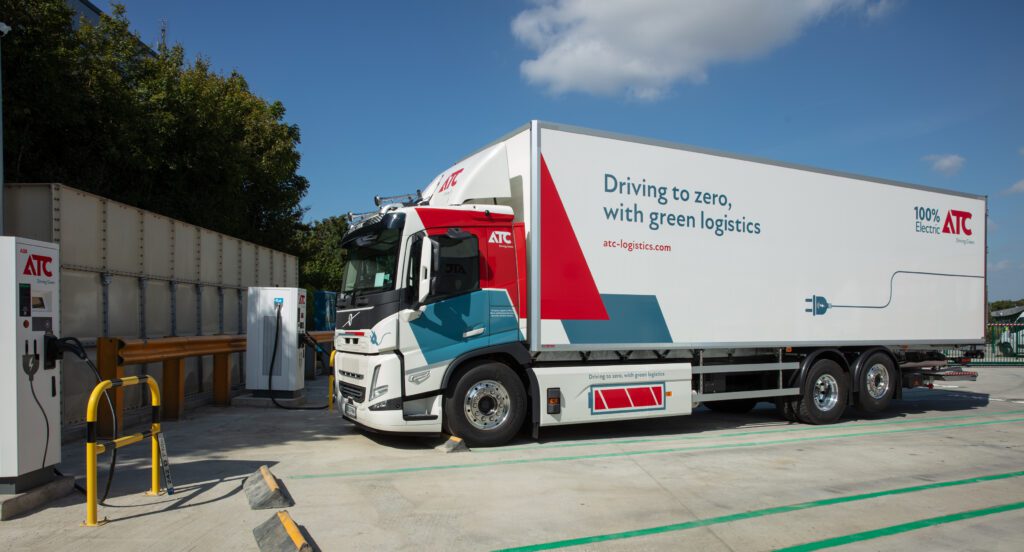
The Role of Battery-Electric Vehicles in Green Logistics and Transport
Transporting goods and people around Ireland and Europe is essential for any economy, but it has always come with a high environmental and social cost. The logistics and transport industry relies heavily on fossil fuels, contributing to climate change and air pollution. ATC asks, ‘How can we make this sector more sustainable and efficient?’ The answer for now seems to be battery-electric vehicles (BEVs).
BEVs run on electricity stored in batteries instead of gasoline or diesel. Some of the many advantages over conventional vehicles include:
- Zero or near-zero tailpipe emissions, which means cleaner air and lower greenhouse gas emissions
- Higher energy efficiency, which means lower fuel costs and less dependence on oil imports
- Lower noise and vibration, which means less noise pollution and better comfort
- Potential for smart charging and integration with renewable energy sources, which means more flexibility and resilience for the electricity grid
As demand for goods continues to rise, so does the environmental burden, making it essential to explore sustainable alternatives.
Driving Green: ATC’s Investment in Battery-Electric Vehicles (BEV)
Demonstrating its unwavering commitment to sustainability, ATC Computer Transport & Logistics has prioritised making transport and logistics more sustainable. The company is investing over €21 million in green technology and transitioning its fleet to battery-electric vehicles (BEVs) over the next five years. This substantial investment forms the backbone of ATC’s ‘Driving Green Strategy,’ a bold initiative designed to decarbonise logistics and transport operations across Ireland and Europe. In taking these decisive steps, ATC reinforced its commitment to achieving net zero by 2030 and setting a clear industry benchmark in Ireland and Europe.
The Promise of BEVs for a More Sustainable Future
BEVs are especially suitable for urban transport, where trips are short and frequent and where air quality and noise are significant concerns. ATC’s latest investment in nine battery-electric Volvo Heavy Goods Vehicles (HGVs) underscores its unwavering commitment to sustainability. These state-of-the-art vehicles are now integral to ATC’s global fleet, enabling the company to meet ambitious sustainability targets while ensuring operational efficiency remains uncompromised. By leveraging electric power generated from renewable sources, ATC further lowers emissions and proves the value of going green in vehicles and infrastructure. This strategic move aligns with the EU’s vision of achieving an 80-95% reduction in greenhouse gas emissions by 2050.
Battery-electric vehicles (BEVs) represent a transformative solution to the environmental challenges of traditional logistics. Unlike internal combustion engines, BEVs produce zero or near-zero emissions, marking a pivotal step in the fight against climate change. Continuous advancements in battery technology have made BEVs increasingly competitive, offering improved energy efficiency and reduced operational costs compared to conventional vehicles.
ATC’s analyses predict that long-haul electric trucks will achieve a lower Total Cost of Ownership (TCO) than their diesel counterparts as early as 2024-2026, depending on electricity and fuel price fluctuations. For urban and regional applications, BEVs are already proving cost-effective. Despite the higher initial carbon emissions associated with battery production, a recent study found that an electric distribution truck driving 500,000 km over its lifespan emits 38% fewer lifecycle emissions than a comparable diesel truck, based on the 2016 EU energy mix. With the expected 2030 energy mix, this figure improves to 63%, and it could reach up to 86% if powered entirely by renewable energy. This demonstrates the tremendous potential of BEVs in transforming logistics towards a more sustainable future.
Policy and Regulatory Support for BEV Adoption
The EU has recognised the potential of battery-electric vehicles and implemented policies to promote their adoption, such as offering a 50% discount on toll fees to electric drivers across Europe (https://www.oireachtas.ie/en/debates/question/2023-11-08/28/). These policies aim to reduce CO2 emissions, improve air quality, and encourage the use of renewable energy.
Delving further into the Total Cost of Ownership of these vehicles, a recent report from FTA Ireland, “Decarbonising the Road Freight Sector”, ranks BEV vehicles at the top of the list regarding cost efficiency. For example, a long-haul truck (return-depot-500km) will cost €0.94/km compared to €1.15/km in a diesel engine. We highlighted further economic benefits in our article “Diesel Vs Electric – The Cost of Ownership for Light Goods Vehicles”, where we concluded that ‘while the upfront cost is significant, there is no doubt that the investment in electric vehicles will be recovered through government incentives and overall savings in running costs’.
Leading the Way in Green Logistics
By transitioning to BEVs, ATC is reducing its environmental footprint and setting a new benchmark for the Irish logistics industry. The company is well on its way to achieving its goal of Net zero by 2030. It anticipates having more than 25% of its fleet tailpipe emission-free by the end of 2024. While cities like Oslo, Lisbon, and Amsterdam lead the way in electric transport adoption, ATC’s significant investment solidifies its position as a frontrunner in this transformative movement.
Keith Young, Managing Director of ATC, emphasises the importance of this investment: ‘We are incredibly proud to be leading the way in creating a more sustainable future for logistics. Investing in battery-electric vehicles is crucial for reducing our environmental impact and supporting our clients in achieving their sustainability goals.’
BEVs are increasingly recognised as the most viable and economically sound future for logistics and transport in Ireland and Europe. ATC’s unwavering commitment to BEVs is a pivotal element of its comprehensive ‘Driving Green Strategy,’ which is dedicated to decarbonising logistics and contributing to a greener future. As ATC continues to drive innovation and invest in cutting-edge sustainable technologies, it enhances operational efficiency and reinforces its leadership within the global logistics industry. For more information on ATC’s green initiatives and to stay updated on the latest developments, visit www.atc-logistics.com.


